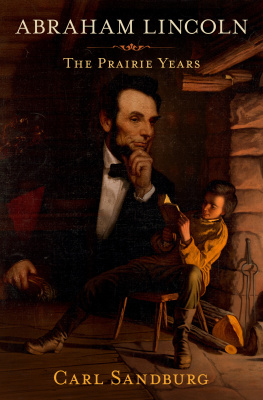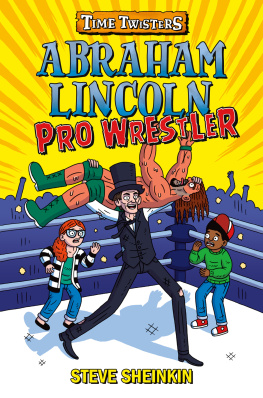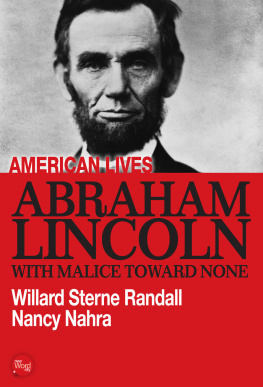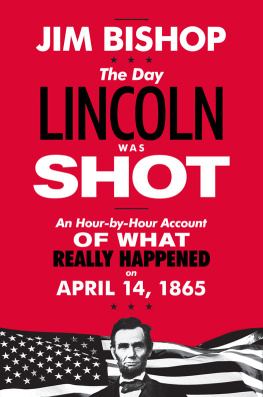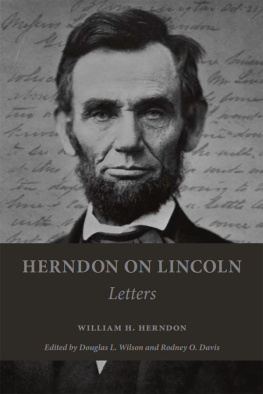Pagebreaks of the print version




ABRAHAM LINCOLN
The Prairie Years
Carl Sandburg
Chapter 1
Wilderness Beginnings
In the year 1776, when the 13 American colonies gave to the world their famous Declaration of Independence, there was a captain of Virginia militia living in Rockingham County named Abraham Lincoln. He had a 210-acre farm deeded to him by his father, John Lincoln, one of the many English, Scotch, Irish, German, Dutch settlers who were taking the green hills and slopes of the Shenandoah Valley and putting their plows to unbroken ground long held by the Indians. These Lincolns in Virginia came from Berks County in Pennsylvania and traced back to Lincolns in New England and Old England. There was a strain of Quaker blood in them; they were a serene, peaceable, obstinate people.
Abraham Lincoln had taken for a wife Bathsheba Herring, who bore him three sons, Mordecai, Josiah and Thomas, and two daughters, Mary and Nancy. This family Abraham Lincoln moved to Kentucky in 1782. For years his friend Daniel Boone, coming back from trips to Kentucky, had been telling of valleys there rich with black land and blue grass, game and fish, tall timber and clear running waters. It called to him, that country Boone talked about, where land was 40 cents an acre. Abraham Lincoln sold his farm; they packed their belongings and joined a party heading down the Wilderness Road through Cumberland Gap and up north and west into Kentucky. Abraham Lincoln located on the Green River, where he filed claims for more than 2,000 acres.
One day about two years later, he was working in a field with his three sons, and they saw him in a spasm of pain fall to the ground, just after the boys had heard a rifle shot and the whine of a bullet. The boys yelled to each other, Indians! Mordecai ran to a cabin nearby, Josiah started across fields and woods to a fort to bring help. Six-year-old Tom stooped over his fathers bleeding body and wondered what he could do. He looked up to see an Indian standing over him, a shining bangle hanging down over the Indians shoulder close to the heart. Then Tom saw the Indians hands clutch upward, saw him double with a groan and crumple to the ground. Mordecai with a rifle at a peephole in the cabin had aimed his shot at the shining bangle. Little Tom was so near he heard the bullet plug its hole into the red man.
Thomas Lincoln, while growing up, lived in different places in Kentucky with kith and kin, sometimes hiring out to farmers, mostly in Washington County. Betweenwhiles he learned the carpenters trade and cabinetmaking. In his full growth he was about five feet nine, weighed about 185 pounds, his muscles and ribs close-knit. His dark hazel eyes looked out from a round face, from under coarse black hair. He could be short-spoken or reel off sayings, yams, jokes. He made a reputation as a storyteller. He had little or no time for books, could read some, and could sign his name.
Thomas Lincoln at 19 had served in the Kentucky state militia. At 24 he was appointed a constable in Cumberland County. The next year he moved to Hardin County and served on a jury. He was trusted by a sheriff and paid by the county to guard a prisoner for six days. In the county jail he could see men bolted behind bars for not paying their debts and at the public whipping post both white and black men lashed on their naked backs. He saw prisoners in the stocks kneeling with hands and head clamped between two grooved planks; if a prisoner was dead drunk he was laid on his back with his feet fastened in the stocks till he was sober.
In 1803 Thomas Lincoln for the sum of 118 pounds in hand paid bought a 238-acre tract near Mill Creek, seven miles north of Elizabethtown, the county seat of Hardin County. In March 1805 he was one of four patrollers appointed in Hardin County to seize suspicious white characters or Negro slaves roving without permits. In March 1806 he was hired by Bleakley & Montgomery, storekeepers in Elizabethtown, to take a flatboat of their merchandise down the Ohio and Mississippi Rivers to New Orleans, earning 16 pounds in gold and a credit of 13 pounds in gold. Account books of the store had him occasionally buying two twists of tobacco, one pound for 38 cents, and one pint of whisky for 21 cents.
And the books show that in May 1806 he went on a buying spree, purchasing four skeins of silk, five yards of linen, four yards of coating, one-fourth yard of scarlet cloth, several yards of Jane and of Brown Holland, three and one-half yards of cassemere, one and one-quarter yards of red flannel, dozens of buttons, and other sundries. Earlier that year he had bought an aristocratic beaver hat for one pound six shillings and a pair of silk suspenders for $1.50. He was courting a woman he meant to marry and was buying clothes and dress goods intended for his bride and himself.
Thomas Lincoln was in love and his wedding set for June 12, 1806, at Beechland in Washington County. Nancy Hanks, the bride-to-be, was a daughter of Lucy Hanks and was sometimes called Nancy Sparrow as though she was an adopted daughter of Thomas and Elizabeth Sparrow whose house was her home.
Lucy Hanks had welcomed her child Nancy into life in Virginia about 1784. The name of the childs father seems to have vanished from any documents or letters that may have existed. His name stayed unknown to baffle and mystify the seekers who for years searched for records and sought evidence that might bring to light the name of the father of the girl child Nancy Hanks.
Lucy traveled to Kentucky carrying what was to her a precious bundle. She was perhaps 19 when she made this trip. She could toss her bundle into the air against a far, hazy line of blue mountains, catch it in her two hands as it came down, let it snuggle to her breast and feed, while she asked, Here we comewhere from? If Lucy was married when Nancy was born it seemed that her husband either died and she became a widow or he lived and stayed on in Virginia or elsewhere. In either case she and their child had to get along as best they could without him.
Of how and where she lived in the years she was raising Nancy not much was remembered or recorded. There were those who said later that it was another Lucy Hanks, not the mother of Nancy, who was indicted November 24, 1789, by a grand jury in Mercer County Court for loose and shameless conduct with men. Months passed and there was no record of a trial of the Lucy Hanks indicted. In those months there came deeply into the life of the mother of Nancy a man named Henry Sparrow, Virginia-born, about her own age, a Revolutionary War veteran who had seen Lord Cornwallis army surrendered to George Washington. Since his fathers death in 1789 he had been caring for his widowed mother, sister and younger brother.
On April 26, 1790, Henry Sparrow, with a brother-in-law, John Daniel, gave bond for a license of marriage between himself and Lucy Hanks. On this same day Lucy Hanks, one of the few women of the time and locality who could read and write, wrote a certificate:

